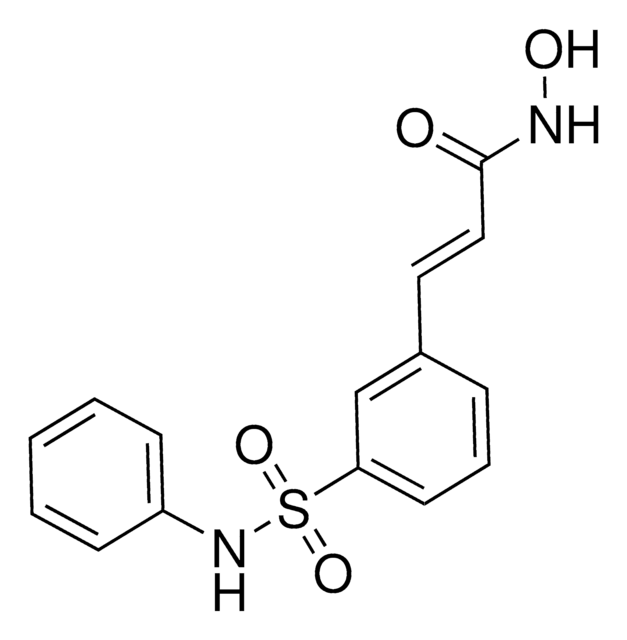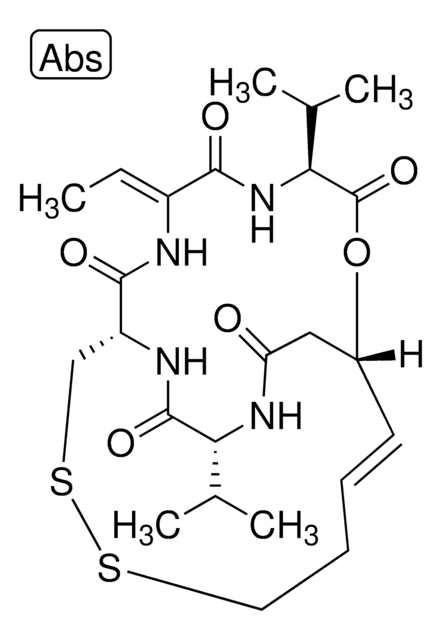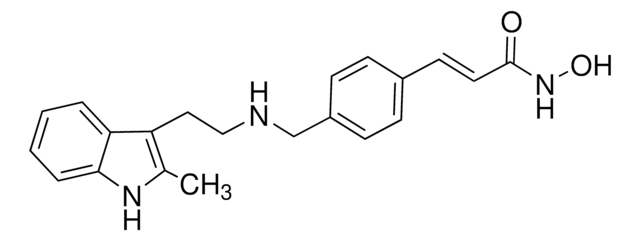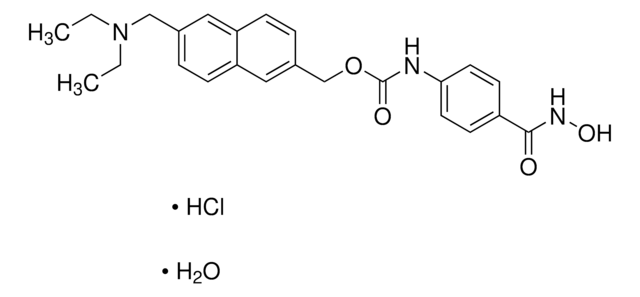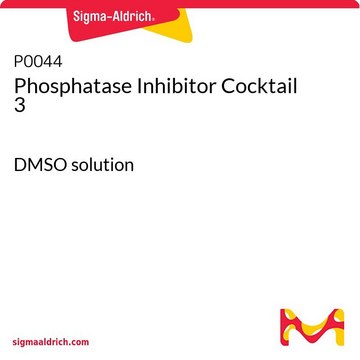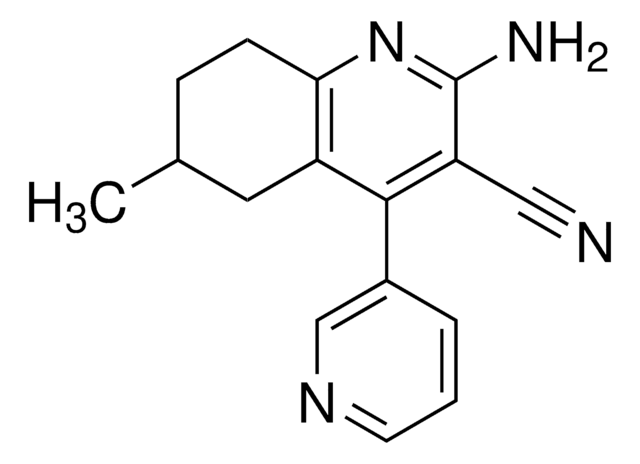Wszystkie zdjęcia(1)
Kluczowe dokumenty
SML2521
BRD6929
≥98% (HPLC)
Synonim(y):
4-(Acetylamino)-N-[2-amino-5-(2-thienyl)phenyl]benzamide, BRD6929, Compound 60, TPB
Zaloguj sięWyświetlanie cen organizacyjnych i kontraktowych
About This Item
Wzór empiryczny (zapis Hilla):
C19H17N3O2S
Numer CAS:
Masa cząsteczkowa:
351.42
Numer MDL:
Kod UNSPSC:
12352200
NACRES:
NA.77
Polecane produkty
Próba
≥98% (HPLC)
Formularz
powder
kolor
white to beige
rozpuszczalność
DMSO: 2 mg/mL, clear
temp. przechowywania
−20°C
ciąg SMILES
CC(NC1=CC=C(C(NC2=C(N)C=CC(C3=CC=CS3)=C2)=O)C=C1)=O
Działania biochem./fizjol.
TPB is a potent and selective inhibitor of HDAC1 and HDAC2. TPB potentiates gnidimacrin activation of latent HIV-1 in cells.
Ta strona może zawierać tekst przetłumaczony maszynowo.
Kod klasy składowania
11 - Combustible Solids
Klasa zagrożenia wodnego (WGK)
WGK 3
Temperatura zapłonu (°F)
Not applicable
Temperatura zapłonu (°C)
Not applicable
Wybierz jedną z najnowszych wersji:
Certyfikaty analizy (CoA)
Lot/Batch Number
Przepraszamy, ale COA dla tego produktu nie jest aktualnie dostępny online.
Proszę o kontakt, jeśli potrzebna jest pomoc Obsługa Klienta
Masz już ten produkt?
Dokumenty związane z niedawno zakupionymi produktami zostały zamieszczone w Bibliotece dokumentów.
Li Huang et al.
ACS medicinal chemistry letters, 9(3), 268-273 (2018-03-16)
We have previously reported gnidimacrin (GM), a protein kinase C (PKC) agonist, significantly reduces the frequency of HIV-1 latently infected cells in peripheral blood mononuclear cells (PBMCs) from patients undergoing successful antiretroviral therapy at low picomolar concentrations ex vivo, which
Stefan Kubicek et al.
Proceedings of the National Academy of Sciences of the United States of America, 109(14), 5364-5369 (2012-03-22)
Under the instruction of cell-fate-determining, DNA-binding transcription factors, chromatin-modifying enzymes mediate and maintain cell states throughout development in multicellular organisms. Currently, small molecules modulating the activity of several classes of chromatin-modifying enzymes are available, including clinically approved histone deacetylase (HDAC)
F F Wagner et al.
Chemical science, 6(1), 804-815 (2015-02-03)
Aiming towards the development of novel nootropic therapeutics to address the cognitive impairment common to a range of brain disorders, we set out to develop highly selective small molecule inhibitors of HDAC2, a chromatin modifying histone deacetylase implicated in memory
Joey L Methot et al.
Bioorganic & medicinal chemistry letters, 18(3), 973-978 (2008-01-10)
We report herein the initial exploration of novel selective HDAC1/HDAC2 inhibitors (SHI-1:2). Optimized SHI-1:2 structures exhibit enhanced intrinsic activity against HDAC1 and HDAC2, and are greater than 100-fold selective versus other HDACs, including HDAC3. Based on the SAR of these
Andrew J Wilson et al.
Cancer biology & therapy, 12(6), 484-493 (2011-07-09)
High grade epithelial ovarian cancers are relatively sensitive to DNA damaging platinum-based chemotherapy, suggesting that the dependencies of ovarian tumors on DNA damage response pathways can be harnessed for therapeutic purposes. Our goal was to determine if the DNA damage
Nasz zespół naukowców ma doświadczenie we wszystkich obszarach badań, w tym w naukach przyrodniczych, materiałoznawstwie, syntezie chemicznej, chromatografii, analityce i wielu innych dziedzinach.
Skontaktuj się z zespołem ds. pomocy technicznej